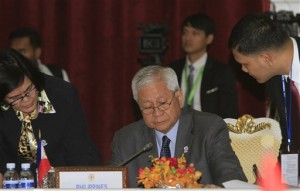DFA: Increased US military presence to be covered by simple executive pact
MANILA, Philippines—The deal that would allow an increased presence of US military forces in the Philippines that is currently under negotiation by the two governments will be forged simply as an executive agreement and within the bounds of the Philippine Constitution and existing defense pacts, the Department of Foreign Affairs said Friday.
The foreign office made this statement late Friday after Senator Miriam Defensor-Santiago, an international law expert and constitutionalist, said the base access agreement would require Senate concurrence.
The DFA did not directly rebuff Santiago’s statement but pointed out the difference between an executive agreement and a treaty, which requires Senate ratification.
“We are cognizant of what constitutes an executive agreement and a treaty. The Philippine negotiating panel will confine the substance of the proposed framework agreement to an executive agreement,” said the DFA.
As envisioned, the agreement will be part of the implementation of the 1951 Philippine-US Mutual Defense Treaty, where both sides agreed to “develop their individual and collective capacity to resist armed attack,” and the Visiting Forces Agreement, which binds US forces to compliance with Philippine law while in the country.
“The IRP (Increased Rotational Presence) Framework Agreement is already within the ambit of the existing MDT and VFA. By this IRP Framework Agreement, we are merely institutionalizing a fuller and more effective implementation of the MDT and VFA,” the foreign office said.
It said also that the agreement will not allow the use or storage of weapons of mass destruction in the country, as provided for in the Constitution.
“We will comply with the constitutional prohibition against nuclear weapons. If we suspect or believe that a vessel or aircraft has a nuclear weapon, we will deny entry,” said the DFA.
The US has a policy of neither confirming nor denying that its ships or aircraft carry nuclear weapons.
The DFA made the statement in question-and-answer form sent out late Friday on the IRP plan, negotiations on which started between the Philippine and US panels on Wednesday in Manila.
The talks began as the Philippines stepped up efforts to project a “minimum credible defense posture” amid security concerns in the region, particularly China’s known military buildup in the South China Sea , part of which the Philippines has renamed West Philippine Sea.
The DFA said the agreement “should not affect relations with China,” but Beijing is known to have long been opposed to “internationalizing” the maritime dispute.
The US, which is currently undertaking a strategic defense pivot to the Asia Pacific as it gradually withdraws from the Middle East, has not taken sides on the conflicting territorial claims but has many times criticized China for its aggressive actions in the disputed waters.
In the statement, the DFA maintained that greater US military presence in the country would not be tantamount to “de facto bases” as some groups have warned.
“No de facto bases or any kind of bases. The Philippine negotiating panel will be totally guided by the provisions of the Philippine Constitution which explicitly prohibits the establishment of foreign bases on Philippine territory,” said the DFA.
The IRP will not deal with operational details and the number of US troops to be allowed in the country will “depend on the scale of operations which we will approve.”
“We are not talking about stationing. We are talking about presence in relation to activities and these activities will be held in AFP-owned or controlled facilities or areas,” the statement said.
Through the agreement, Philippine troops would stand to benefit from “high-impact and high-value joint exercises which promote interoperability and capacity building that will also bolster humanitarian assistance and disaster response.”
“The IRP Framework Agreement prepares us from any and all forces which may bear ill intentions towards us… If one is better prepared, external elements that have ill intentions will tend to think twice,” said the DFA, echoing the same line used by various Philippine administrations in their defense of US military bases in the country in the past.
The IRP would also help speed up the government’s efforts to modernize the military as “the US rotational presence will maximize the resources we are providing to upgrade our defense.”
“It will take us many years to bring us to the level of modernization that we seek for our AFP. With the support of all Filipinos, the IRP Framework Agreement will significantly help the country to temporarily fill that gap,” the DFA said.















